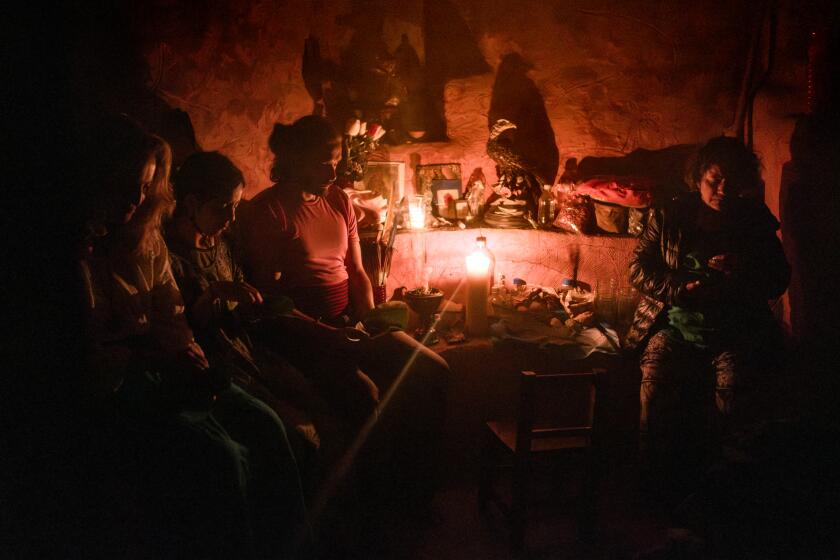Unsung hero: Nurse-midwife Robbie Prepas goes to disaster scenes
Editor’s note: This is an installment of Unsung Heroes, an annual feature that highlights otherwise overlooked members of the community.
When hurricanes, floods or earthquakes strike, Robbie Prepas heads to the scene, offering medical aid to people in need.
For the record:
12:55 p.m. Dec. 21, 2017An earlier version of this post incorrectly stated that nurse-midwife Robbie Prepas expected the federal government to deploy her to Washington, D.C., in January.
The Laguna Beach resident and certified nurse-midwife joined the United States Department of Health and Human Services’ Disaster Medical Assistance Team before the Sept. 11 terrorist attacks in 2001.
Prepas has been deployed following 10 disasters, including hurricanes Katrina in 2005 in New Orleans, Harvey and Maria earlier this year in Houston and Puerto Rico, respectively, and the 2010 earthquake in Haiti.
The U.S. government sends teams to areas following disasters such as floods, earthquakes, fires and disease outbreaks. Team members can include nurse practitioners, physician assistants, medical officers, registered nurses, respiratory therapists, paramedics and pharmacists.
Prepas has delivered babies in airports and assisted with emergency c-sections.
In November, Prepas returned home after a 17-day visit to Comerio, a city in a mountainous region of Puerto Rico. Crews there had erected tents and provided medical care for acute and chronic conditions, such as physical exams and wound sutures, Prepas said earlier this week in a phone interview.
Volunteers held a community clinic, working alongside Puerto Rican medical personnel. Crews visited 40 houses that held people too ill to come to the clinic, Prepas said.
“We saw a lot of tetanus and a lot of upper-respiratory issues,” said Prepas, who worked as a nurse-midwife at Fountain Valley’s Orange Coast Medical Center. “The country lost power and residents struggled to find any clean water.”
Parts of the island are still without power almost three months after the hurricane struck, and the power grid is operating at 70% of capacity, the New York Times reported this week.
In Houston, crews saw 200 to 300 patients per day, Prepas said, adding that most people lost medications or needed dialysis.
The aftermath of Hurricane Maria was much different than in Houston, Prepas said. When towns in Puerto Rico lost power, people lost use of oxygen machines.
Prepas’ penchant for service started 30 years ago when she accompanied her husband, Stephen, a pediatric ophthalmologist, on medical missions.
They traveled to countries including Afghanistan, Vietnam and Myanmar. Prepas taught midwife classes, advising providers about hemorrhages, internal bleeding and infections, while Stephen performed corrective eye surgeries for children.
Even though relief teams followed the work of Prepas and other volunteers in multiple cities, she said it’s sometimes difficult leaving people who struggle to obtain clean water and medical supplies.
“You feel guilty because you are leaving and they are in the same situation,” Prepas said.
As examples, she mentioned the relative ease of accessing electricity, running water and the Internet in the U.S.
“I had a hard time after Katrina,” Prepas said. “There is an abundance of people who don’t have anything.”
Despite the lack of resources, Prepas said patients remain grateful for the help and want to show their appreciation.
Puerto Ricans prepared food for her and colleagues.
Disaster team members are on call for one month at a time, every three to four months.
Closer to home, Jennifer Flowers met Prepas 20 years ago and the two have been friends since.
They walk their dogs together and attend theater performances.
“She is the person everyone thinks of first when they need help,” Flowers wrote in an email. “She is always more interested in my life than I am.”
Twitter: @AldertonBryce
ALSO
Unsung hero: Kathryn Rollins helps senior citizens ‘take control of their bodies and lives’
Unsung heroes: Brad and Trish Miller bring food and friendship to Main Beach
More to Read
Sign up for Essential California
The most important California stories and recommendations in your inbox every morning.
You may occasionally receive promotional content from the Los Angeles Times.











